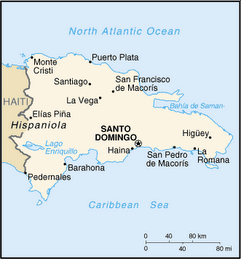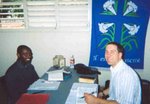One week after the earthquake things are becoming chaotic in Haiti. Food and water that has been donated is slowly finding its way to the people. Their is a bottleneck of planes at the Port au Prince airport and their is a back-up of trucks at the border trying to get across safely and actually make it all the way to the capital without being assaulted.
The hospitals are all full. Victims have been helicoptered to Jimani in the center of the country, Barahona in the south and many to Santo Domingo. Some of the wounded government officials were brought to a Santiago hospital (HOMS), the newest one in the country.
There have been reports in the Dominican newspapers that because of the shortage of gasoline in Haiti, the price at the border has shot up to 300 gourdes per gallon ($10US) and most of the gas stations close to the border have been militarized.
The majority of the international aid is being directed to Port au Prince which has received the greatest amount of news coverage. People are now becoming aware of the other cities further out from the capital that were also affected, such as Leogone where 90% of the buildings were destroyed.
Some of the topics being discussed among the Dominicans are how many refugees this country will be able to absorb, realizing that most of them will not want to go back after their injuries have been treated and they have recovered. People are also wondering what will become of children left without parents. They are signing up to adopt children that have lost their families, but these adoptions will be some time in the future as a search will have to be made for family members. There is also a debate as to whether the capital should be rebuilt in the same location or if it should be completely razed and moved to a different part of the country.
Most Dominicans believe that even after the rest of the world forgets about the earthquake, they will be picking up the pieces, helping their Haitian neighbors rebuild and making decisions long after the international community has moved on. In spite of the tensions between the two countries on the island, the response of the Dominicans has been very generous. Besides receiving many of the wounded in DR hospitals (at DR expense), food, water and financial aid have been given. Many Dominican kitchens on wheels have been working non-stop in Port au Prince (more than 30 I believe).
These are topics that will be decided in the future. For right now, the greatest need is food, water and bandages - which have been exhausted in Haiti and in the DR, and people are also being asked to donate blood.
January 18, 2010
Subscribe to:
Post Comments (Atom)






Thanks for keeping us updated!
ReplyDelete